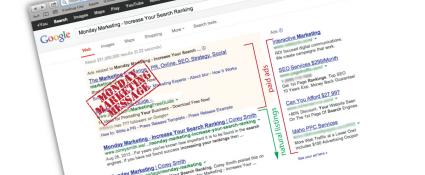
You may have heard the terms SEO and SEM bandied about over the last few years. I am reasonably confident that at least half of the so-called professionals that are in the search industry don't really know what they are talking about. They tend to use these two terms interchangeably.
In fact, you can especially identify someone that doesn't understand the distinction of these two terms when they say things like:
- Sign up for SEO and get more traffic.
- Let us do SEO for you and you'll sell more stuff.
- Guaranteed top of Google in X months.
There is a clear distinction between these two terms and, if you are going to hire someone to help you, you must know that distinction. In fact, if you are going to do it yourself, you should understand the difference. It is safe to say that all SEO is SEM but not all SEM is SEO.
SEO - Search Engine Optimization
SEO is the process of getting key terms for your web presence to the top of the natural (not paid) results in the search engines. Usually, we use the term in conjunction with Google searches but it applies to any search engine. SEO is a big job; there are more than 75 factors that go into just ranking your local page in Google alone.
There are many key tactics that go into getting higher in the search engines. It can be broken down into three key categories:
- Code: The way your website is built on the back end. How the title is written or the organization of the page content in the coding section.
- Content: The more content people can read, the greater your likelihood of getting higher in the search engines.
- Links: Inbound links act as a vote to the authority of your website. The more links, the better.
Just remember, SEO has to do with the natural listings. When you see the paid placements in search results that is not SEO.
SEM - Search Engine Marketing
The purpose of SEM is to gain overall improved visibility in the search engines whether it be through paid or non-paid locations. That could mean using SEO to get to the top of the natural listings or pay for an ad on the search engine results page (SERP).
All the major search engines provide you with the ability to buy a key word as an advertisement. When you conduct a search, the search engines will return to you a list of all those that are paid first then those that naturally appear at the top of the search engines through SEO.
Any listing on the SERP is through SEM but only the organic or natural listings are from SEO (or they just got lucky).
What This Really Means
So what’s the takeaway? SEO is unpaid and solely uses information in the categories of code, content, and links. SEM, on the other hand, takes both SEO and paid search results into account.
SEO does not directly generate traffic but will when you get enough of the right terms to the top of the search engines. SEM, when done right, can generate lots of traffic starting day one.
When you get traffic from your SEM, don't expect an immediate influx of sales. Just because they come, it doesn't mean they will buy. If your website does what it's supposed to and you've performed your SEM properly, you greatly increase your odds of great performance.

